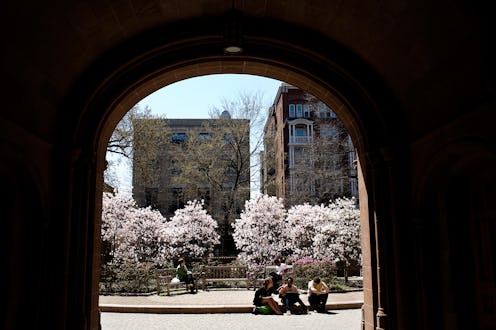News
What Are The Yale Protests All About?
A viral video of a Yale student yelling at a professor circulated across social media last week triggered a heated discussion over racial tensions at the country's third-oldest institution of higher learning. To outsiders, the incidents seemed a bit like overkill, with many critics claiming that backlash over offensive costumes did not warrant the types of fervent protests being waged by minority students on campus. However, a closer look at what's really behind the Yale protests reveals that there might be more here than some people are willing to shake a stick at.
In an op-ed column for The Huffington Post, Yale senior Aaron Lewis broke down the range of microaggressions and racist incidents that culminated in a shouting match between Yale professor Nicholas Christakis and an unnamed student on Nov. 5. "Unfortunately, the short YouTube clips and articles I've seen don't even come close to painting an accurate picture," Lewis lamented.
Video footage of the original argument, captured by a bystander and posted online afterward, showed Christakis calmly standing among a group of peaceful students, discussing an email sent by Associate Master of Silliman College Erika Christakis (Nicholas Christakis' wife) to students on Oct. 30. In the email, Christakis' wife had written that she had been approached by a number of students "frustrated" by a message sent to the student body concerning "appropriate Halloween-wear." Erika Christakis then suggested that students who were upset by offensive Halloween costumes should simply "look away" or tell the offender that their costume was offensive. "Talk about it," she wrote.
Students — especially minority students — were incensed. Even after Christakis attempted to intervene on his wife's behalf by meeting with students on campus later, it seemed the damage had already been done. In the video, which was supposedly captured one hour into the Nov. 5 meet-up, the professor attempted to explain that, while he understood the offensive nature of inappropriate costumes was upsetting, "Other people [had] rights" as well. "Be quiet!" the unnamed female student scolded, interrupting Christakis before he could finish his thought.
"It is your job to create a place of comfort and home for the students that live [here]," the student explained. "By sending out that email, that goes against your position as master [dean of students]. Do you understand that?"
It was a memorable exchange. Within days, protests calling for Christakis' removal had erupted and most of social media had viewed the footage at least once, with the majority of users freely airing their opinions. "Our parents protested the Vietnam war, our kids protest whether Halloween costumes are micro-aggressions," wrote one Twitter user blearily. "WTH Yale?"
However, Lewis, who studies cognitive science and design, maintained in his column Monday that there was more to the situation than meets the eye. "For starters: the protests are not really about Halloween costumes or a frat party [but] about a mismatch between the Yale we find in admissions brochures and the Yale we experience every day," Lewis wrote. "The university sells itself as a welcoming and inclusive place for people of all backgrounds. Unfortunately, it often isn't."
He then cited a number of instances in which students had shared with one another times that they had felt attacked or unsafe, including one incident last year when a freshman dorm was defaced with swastikas. "It took almost a full week for Yale's president to formally acknowledge students' legitimate concerns about racism," Lewis explained, saying that students protested the incident by gathering for an open forum night and chalking up the sidewalks with positive messages. "Students should not have to become community organizers just to receive acknowledgement and respect from their administrators," he lamented.
Despite the most recent activist efforts being panned by some as trivial (The Atlantic even went to far as to suggest that the protests had "devolved into an effort to censor dissenting views" in a column on Monday), it seems there's more to the current strife on Yale's campus that people are letting on.
